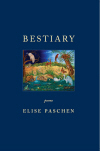Bestiary
Every poem in Paschen's Bestiary has been carefully groomed; each poem still stays a little feral, mostly concerning what strange things we do in our own familiar homes: A woman bears the chrysalis of her son in her wandering body, a mother nurses amid a welter of storybook patterns, the vagaries of gods and storms and men thunder in the background…
Every poem in Paschen's Bestiary has been carefully groomed; each poem still stays a little feral, mostly concerning what strange things we do in our own familiar homes: A woman bears the chrysalis of her son in her wandering body, a mother nurses amid a welter of storybook patterns, the vagaries of gods and storms and men thunder in the background…
Two different sorts of domesticity are at play within Bestiary: the repainting of ancient stories (or the wildness we've always known lives within the home), and then the echo of those myths crackling in today's hearth-side. The words themselves uphold the themes of light and dark, ocean and earth, suspension and splitness, neither hereness nor thereness: "Night falls. / Suspended between timber / and foam, buoyed, then dropped, we pitch, catch hold. The sea / cradles the sighing hull."
Thematically, Paschen splits the collection into thirds. The first third mainly concerns vivacity and fecundity, humans twining with nature, and the fertile relationship that develops between Paschen and her husband (and, eventually, their two children). Spring would be an appropriate theme, when riotous nature breaks bonds and taboos while reproducing itself:
How much space will you need
to grow? A galaxy
of cells, then the heartbeat.
You nose-dive down. A dove
hoo, hoo, hooing. Above
lodestar, a slip of moon.
Paschen's nature descriptions themselves, reminiscent of Louise Erdrich, showcase this collection's true strength in lines such as: "Night-fall, we stretch and tumble under rafters, / beneath the moon. Bats' breath against our lips." But the poems disappoint when they content themselves with obvious, facile lines such as "Snuggling between a wedding photograph, / we now play Hearts instead of Solitaire." Sentimentality and portents are allowed a little too much free rein.
In the second part, deep autumn falls over the poems. You can nearly hear leaves breaking underfoot. The lines slacken their celebrations and turn instead toward the slightly sinister undertow of the season. Things are going dormant, preparing for something deep to happen: "The sky turns brackish green. I'm caught / outside and hear a rumble growing louder, / stomping the heart."
The final section is arguably Paschen's strongest – she skirts what could easily be cloying, and instead gives readers a supple, nuanced portrayal of how we carry on when we no longer know the proper rules and rituals. Paschen addresses that dusky in-between-ness of dying as she witnesses both her parents' passings. In "Ash," Paschen equates her father's crematory remains to moths, wood shavings from a fallen tree – all ephemeral – both linked and burned by those who continue to live. Her mother, a ballet dancer, first dances death and then herself enacts it.
Death seems to grapple for survival, as life's cycles slowly continue. Spring slowly dawns – far away, still cold, but coming. The gardener, Jesus, makes appearances, as Paschen intones "Where you seek permanence is death. / Where you seek change, there you find life."
There is life indeed in this half-tame, half-rampant bestiary.





